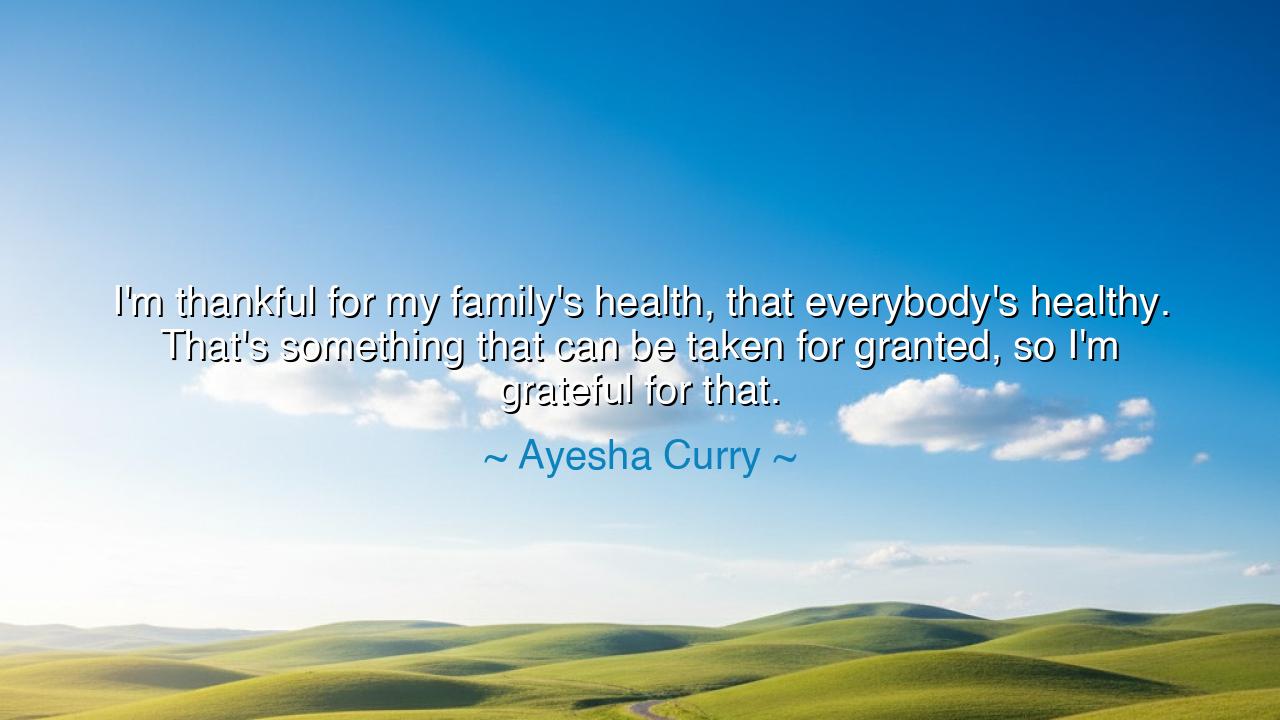
I'm thankful for my family's health, that everybody's healthy.
I'm thankful for my family's health, that everybody's healthy. That's something that can be taken for granted, so I'm grateful for that.






When Ayesha Curry declares, “I’m thankful for my family’s health, that everybody’s healthy. That’s something that can be taken for granted, so I’m grateful for that,” she speaks not in the voice of fame or fortune, but in the eternal voice of the human heart. Her words remind us that among all treasures—wealth, success, recognition—none is as vital or as precious as health. It is the invisible pillar upon which all other joys stand, and when it is secure, life flourishes; when it falters, no other possession can make up for its loss.
The essence of her reflection lies in the tendency of men and women to take for granted what is most essential. Each breath, each beating heart, each day without pain—these are gifts so constant we forget to cherish them. Ayesha Curry reminds us that to live in the company of loved ones whose bodies are whole and spirits unburdened by illness is not ordinary—it is a blessing. Her gratitude reveals wisdom: that we must learn to treasure what is always present, lest we only recognize its value once it is gone.
History is filled with examples that prove her point. Consider the reign of Marcus Aurelius, emperor of Rome, who despite commanding the vastest empire of his age, wrote in his Meditations about the fragility of health and the necessity of appreciating each day. Or think of Franklin D. Roosevelt, who though struck by polio and confined to a wheelchair, carried the burden of illness throughout his presidency, teaching the world by contrast how easily we overlook what is precious until it is lost. Their lives show that health is the foundation of strength, and gratitude for it is the mark of the wise.
Her words also point toward the sacredness of family. To be thankful not only for one’s own well-being, but for the health of children, spouse, and parents, is to acknowledge that life’s deepest happiness is woven together. One’s personal joy is incomplete if those we love are unwell. In this way, Ayesha’s gratitude expands beyond self into the realm of shared life—she rejoices because her household stands together in wholeness. This is a lesson in love: that true contentment is bound to the well-being of those around us.
Her thankfulness is also an act of humility. She does not boast of accomplishments or material comforts, though she has many. Instead, she bows her head to the simplest of gifts: the body functioning, the family unharmed. In this humility lies a powerful teaching—that gratitude for the smallest blessings creates a heart more joyful than one chasing endless gain. To live with constant awareness of health as a gift is to live in daily thanksgiving.
The deeper meaning here is that gratitude protects the soul from blindness. When we forget to honor the blessings of health, we risk falling into ingratitude, complaining over what we lack instead of marveling at what we already possess. But when we train the heart to be thankful for every morning without sickness, every evening spent with loved ones safe, life becomes richer, more peaceful, more luminous.
So I say to you, children of tomorrow: do not wait until illness arrives to value health. Each day, give thanks for your body and the bodies of those you love. Cherish the strength of your parents, the laughter of your children, the vitality of your companions. Let thankfulness be your daily song, for health is the silent treasure upon which every joy is built. And when you live in this constant gratitude, your heart will never be poor, even in times of trial.






AAdministratorAdministrator
Welcome, honored guests. Please leave a comment, we will respond soon